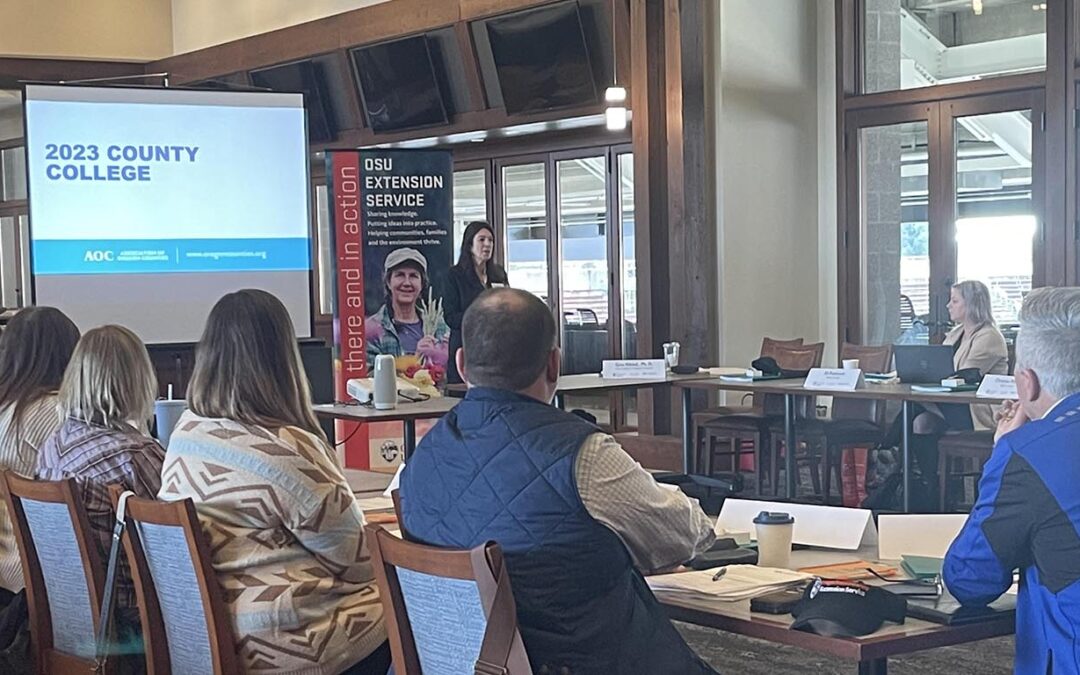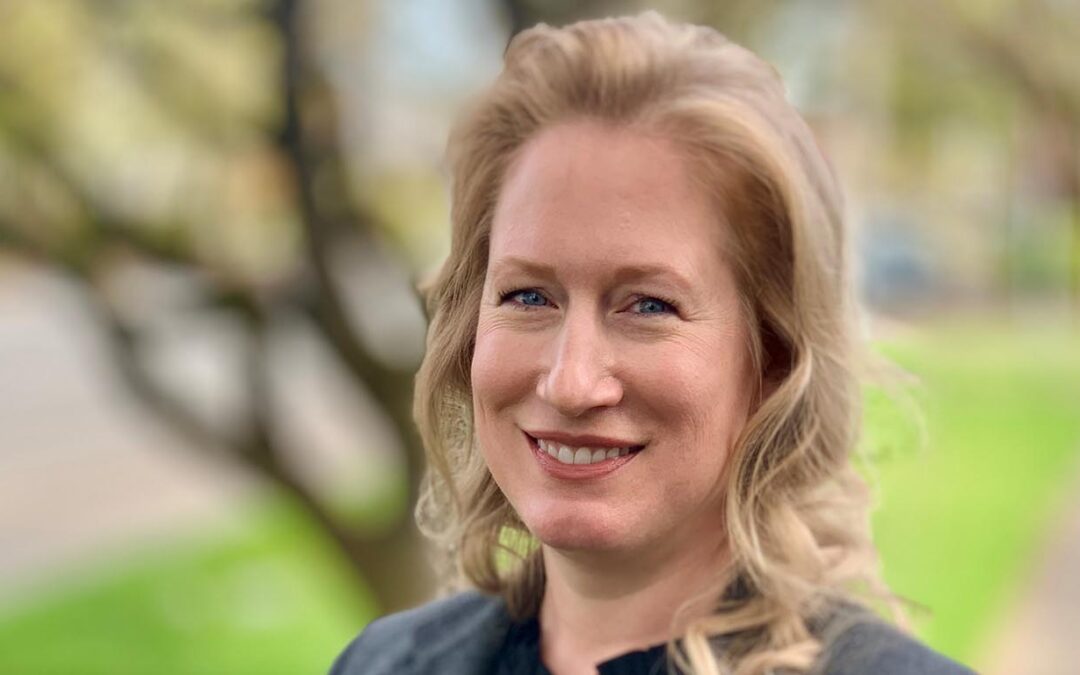
Jan 30, 2023 | Member Services
Twenty-six students from diverse backgrounds in county government gathered at Reser Stadium and the Alumni Association building at Oregon State University (OSU) in Corvallis mid-January for the Association of Oregon Counties’ (AOC) revered new member program, County College. County commissioners, judges, staff; OSU Extension staff; and partners make up the 2023 cohort.
The January session kicked off the first of five educational sessions in 2023 aimed at providing new commissioners, judges, chairs, and high-level staff a comprehensive overview of the responsibilities and authorities of counties and county elected officials.
The program, designed in partnership with OSU Extension Service, offers sessions led by professionals in core county service areas, including: community and economic development, finance, human services, infrastructure and public works, public safety, leadership, and management.
During the first training, participants gained insights on broad programming information about AOC and its federal partner, the National Association of Counties (NACo); government ethics; the history of counties and county structures; duties and responsibilities of county administrators; public records; risk; legal considerations; and partner organizations, OSU and CIS.
“This first session of county college has been terrific both to learn new aspects of our role in government, and to connect with new commissioners from across the state,” commented Baker County Commission Chair Shane Alderson. “To serve our constituents to the best of our ability means that we must always be willing to learn.”
Eleven instructional years into the program, participants are finding content to be as valuable as it was in its first year, in 2006. Originally offered annually, the program shifted to a biennial offering in 2009.
“AOC is proud to continue offering this critical service to our members. We enjoy seeing our members build strong relationships in their cohorts, and developing curriculum that benefits members, counties, and Oregonians from here into the future,” commented AOC Executive Director Gina Firman Nikkel, Ph.D.
The 2023 County College class will meet next at the AOC offices February 16-18 and will cover a range of topics including: the AOC legislative process, advocacy, and transportation and natural resources policy portfolios.
For more information on County College visit: https://oregoncounties.org/education/county-college/ or reach out to program administrator: Kristen Paul.
Contributed by: Megan Chuinard | Public Affairs Associate

Jan 30, 2023 | AOC News
The Association of Oregon Counties (AOC) is a 23-member staff of professional employees with broad duties and skill-sets. Each team member helps make AOC the success it is today. Here is an opportunity to meet a member of your AOC team.
Meet AOC Legislative Affairs Manager, Jessica Pratt
Jessica Pratt joined the AOC team in April of 2022 as legislative affairs manager. In her role, Jessica advocates for Oregon counties’ priorities at the State Legislature and with state agencies, covering health and human services policy portfolio. That work includes coordination for the newly revived Local Government Advisory Committee for health and human services, a collaborative forum for local elected officials, their local partners, and the directors of the Oregon Health Authority and the Oregon Department of Human Services to guide public system design and the state-county shared services partnership.
She brought a deep understanding of complex mental and behavioral health policies critical to counties to AOC. Prior to joining AOC, she served as interim director of AOC associate member organization, Association of Oregon Community Mental Health Programs; staff for the Office for Oregon Health Policy & Research; as well as more recently working for the Foundation for Excellence in Mental Health Care.
She brings an understanding of front line public behavioral health work from her early career experience as a crisis associate at the Marion County Psychiatric Crisis Center in Salem.
Jessica holds a Bachelor’s degree in Spanish from Willamette University.
AOC Legislative Affairs Department
Jessica’s role is housed in the AOC Legislative Affairs Department. The Legislative Affairs Department is a five-member team that advocates for counties at the State Capitol, within state agencies, and with federal partners to pursue a policy agenda set by AOC members.
Why Jessica Loves AOC
“I am so excited to be back working for counties again. It is a privilege to champion this diverse body of passionate public servants who rise to every challenge to maintain the public services we all rely on every day and make our communities great places to live and raise our kids.”
What Interests Jessica in Her Work
“I grew up exploring the forests and creeks around my grandpa’s house in Douglas County and helping my dad bring in the hay on his ranch in Baker County. As an adult, I’ve lived and worked in Marion, Multnomah, and Washington counties and hiked the amazing trails in every corner of the state. I’ve visited every community mental health program in Oregon and have seen the care and creativity of county commissioners and community members continuously weaving together the people, facilities, and funding streams to meet changing needs. I love drawing on all those experiences as I listen and bring together the voices and the knowledge of county commissioners from across Oregon to solve statewide problems and empower every community to thrive.”
What Jessica Wants to See in the Future for AOC
“When I started working with them in 2007, the awesome legislative team at AOC had been serving together for about twenty-five years. They were trusted sources of information and leadership in the Capitol and at every state agency and enjoyed a warm camaraderie. I look forward to helping grow the next generation AOC team and steward our state-county partnerships with them in the coming decades.”
Outside of AOC
Jessica currently enjoys exploring the beaches, mountains, and waters of Oregon with her husband and five and seven year old kids.
Contributed by: Megan Chuinard | Public Affairs Associate

Jan 30, 2023 | AOC News
The 2023 Legislative Session is underway, and new bills continue to be introduced. Below are bills in the current billstack that the Association of Oregon Counties (AOC) legislative affairs team have identified as impacting AOC’s legislative priorities for the Session.
COMMUNITY DEVELOPMENT PRIORITY
Systemic Solutions to Statewide Housing Shortages – advocate for state investments that boost local government permit processing staff and capacity, and a fast-track process for limited urban growth boundary expansions that significantly increase affordable and workforce housing in all communities experiencing shortages of buildable land.
RELATED BILLS
- LC 2044 will be introduced by Representative Pam Marsh (D-Ashland) as part of a suite of bills aimed at this priority, this concept provides state investments in local government permitting staff capacity ($45 million), land use system education ($1.1 million), and creates regional housing coordinators ($3.6 million).
GOVERNANCE & REVENUE PRIORITY
Support adequate funding of county assessment and taxation services.
RELATED BILLS
- HB 2088 is meant to provide sustainable funding for assessment and taxation services. Historically, the state has provided about 33 percent of the funding, but after 2007, the state’s share has been reduced to around 12 percent. HB 2088 holds back three percent from all taxing districts to pay counties for their assessment and taxation funding. The bill as written is not expected to move, but a workgroup convened by the committee chair will be meeting to address the structural funding deficit. On Jan. 25, the House Committee on Revenue heard HB 2088. AOC President Derrick DeGroot testified on behalf of AOC and spoke strongly in favor of the concept and offered support from AOC for any work that results in sustainable funding for the counties assessment and taxation services.
HEALTH & HUMAN SERVICES PRIORITY
End liability risk shift to counties and local system providers for mandated populations (aid and assist, civil commitment, and guilty except for insanity).
- SB 319 provides that a person who contracts with a public body to provide services for purposes of community restoration or to restore fitness to proceed is a state officer, employee, or agent for purposes of indemnification under Oregon Tort Claims Act. This concept, filed by Senator Floyd Prozanski (D-Eugene) as a Senate Judiciary Committee bill, is a safety line for community providers and counties while longer term solutions are crafted and put in place. It is supported by a coalition including the Oregon Trial Lawyers Association; Disability Rights Oregon; NAMI Oregon; Oregon AFSCME; Oregon Council for Behavioral Health; the Association of Oregon Community Mental Health Programs; Clackamas, Lane, Multnomah and Washington counties; and the Association of Oregon Counties.
NATURAL RESOURCES PRIORITY
Enhance county role across the natural resources – protect and enhance county funding and flexibility to support management policies and locally focused policy making processes for wildfire resiliency efforts, place-based planning efforts, and drought resiliency, as well as sound land management.
- SB 80 is a wildfire placeholder bill. The concept should include the resources and capacity necessary for counties to implement the wildfire preparation, mitigation, and defense measures in SB 762 (2021) on an ongoing basis.
- LC 3292 is a water planning concept by Representatives Ken Helm (D-Beaverton) and Mark Owens (R-Crane). The concept will lift the sunset on place-based water planning and allocate funding to the Oregon Water Resources Department.
- LC 1895 is a drought resilience concept. This forthcoming package by Representatives Ken Helm (D-Beaverton) and Mark Owens (R-Crane) will help address drought resiliency and support efforts to mitigate this persistent issue facing Oregon counties.
PUBLIC SAFETY PRIORITY
Increase state investments in district attorney salaries and address the widening pay gap between elected district attorneys.
- HB 2308/POP 101 provides for state funding for pay equity, the elimination of the two tiers ($1.5 million).
- HB 2311/POP 102 – provides for state funded increases in district attorney salaries ($3.48 million).
- HB 2392/POP 104 – provides for state funding for processing digital evidence and body cams ($14.4 million).
- HB 2391/POP 105 – provides for state funding for district attorney crime victim services ($25.5 million).
- LC 970/POP 106 – provides for state funding for indigent defense discovery ($6 million).
- POP 107 – provides for state funding for recording grand jury proceedings ($384,000).
TRANSPORTATION PRIORITY
Advocate for fair and sustainable funding to effectively and efficiently manage counties large and diverse road systems by:
Preserving the Surface Transportation Block Grant (STBG) State Fund Exchange Program
- HB 2101 is a Joint Committee on Transportation committee bill that would codify the STBG Fund Exchange program and create long term stability for the program. AOC is in negotiations with the Oregon Department of Transportation on an amendment.
Creating the statutory authority for counties to charge cost-recovery fees for permits issued to utilities for work in the county road right of way.
- SB 635 is chief co sponsored by Senator Lew Frederick (D-Portland) and Senator Lynn Findley (R-Vale), reintroduction of HB 3049 (2021)
ADDITIONAL AOC PRIORITY BILLS
- HB 2261 ensures that the 2.5 percent of dedicated video lottery proceeds reach Oregon counties and continues key investments in local economic development.
- SB 460 provides General Fund backfill for revenue losses from Ballot Measure 110 in the amount of $34.8 million to impacted counties ($34.8 million to cities)
The AOC legislative affairs team looks forward to ongoing conversations with Governor Tina Kotek and legislative leadership to strengthen the state-county partnership on critical services and functions for all Oregonians.
Contributed by: The AOC Legislative Affairs Team
- Anna Braun (503.901.7023), Contract Lobbyist, Governance, Revenue, & Veterans
- Michael Burdick (503.522.9743), AOC Legislative Affairs Manager Public Safety & Community Development
- Jessica Pratt (503.515.6884), AOC Legislative Affairs Manager Health & Human Services
- Branden Pursinger (503.320.3579), AOC Legislative Affairs Manager Natural Resources
- Brian Worley (503.810.9902), AOC County Road Program Director Transportation

Jan 26, 2023 | Public Safety & Veterans
When a person’s behavior causes concern for their welfare, they can be forced to enter a treatment facility in a process called civil commitment–even if they don’t pose an immediate danger to themselves or others. Civil commitment is a thorny issue because, on the one hand, communities have a responsibility of care; but on the other hand, communities must respect individuals’ rights and freedoms. Furthermore, individuals left to experience acute mental health crises without support may pose a danger to themselves or others, and compelling treatment may be a better option than leaving them unsupported.
Historically, there were many cases where the civil commitment process was abused, sometimes causing egregious harm. Those abuses led to reforms making the process much more difficult to pursue. Civil commitment is rarely used in Oregon, partly because of difficulty finding placement for those who may be in need. It has also been argued that the legal standard for civil commitment in Oregon may be higher than necessary.
Oregon’s outgoing chief justice, Martha Walters, established the Commitment to Change Workgroup last year, to grapple with these difficult questions. The workgroup includes representatives from the criminal justice system like judges, district attorneys, public defenders, and law enforcement. Also represented are legislators, local governments, and healthcare leaders such as the Association of Oregon Community Mental Health Programs, disability rights advocates, mental health and addiction care providers, and state agencies. There is currently an opening on the workgroup for someone to represent counties. Anyone interested in this opportunity should reach out to AOC Legislative Affairs Manager for Public Safety, Michael Burdick, for more details.
Contributed by: Michael Burdick | Legislative Affairs Manager

Jan 26, 2023 | Governance, Revenue, & Economic Development
Hours after being officially sworn in, Governor Tina Kotek signed three executive orders focused on housing and homelessness. One creates a new advisory board to develop recommendations for speeding up home construction enough to bring an end to our chronic housing shortage within 10 years. The council is supposed to issue its recommendations by the end of 2023.
The executive order creating the council doesn’t require that local governments be represented, but the governor’s office recently contacted the Association of Oregon Counties (AOC) to encourage its members to apply. Applications are being accepted now at this website; no deadline to apply has been announced.
Contributed by: Michael Burdick | Legislative Affairs Manager





